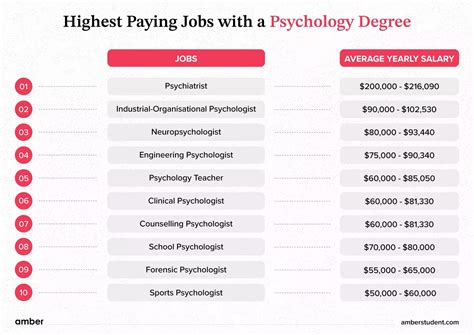Psychology is the scientific study of the human mind and behavior. It is a broad field that encompasses many different areas of study, including clinical psychology, counseling psychology, school psychology, industrial-organizational psychology, and social psychology.

A psychology degree can open up a wide range of career opportunities. In fact, according to the American Psychological Association, there are more than 180 different jobs that you can get with a psychology degree.
Common Psychology Degree Jobs
Some of the most common jobs that psychology graduates get include:
- Clinical psychologists provide therapy to individuals and families who are struggling with mental health issues.
- Counseling psychologists help people to cope with personal and emotional problems.
- School psychologists work with children and adolescents to help them with academic, social, and emotional problems.
- Industrial-organizational psychologists work with businesses and organizations to improve employee productivity and satisfaction.
- Social psychologists study the social behavior of individuals and groups.
Other Psychology Degree Jobs
In addition to the common jobs listed above, there are many other jobs that you can get with a psychology degree. These jobs include:
- Human resources managers
- Market researchers
- Policy analysts
- Social workers
- Teachers
- Writers
- Researchers
What Can You Do with a Psychology Degree?
As you can see, there are many different jobs that you can get with a psychology degree. The key to finding the right job for you is to identify your interests and skills. Once you know what you are interested in and what you are good at, you can start to explore the different career options that are available to you.
How to Get a Psychology Degree
If you are interested in getting a psychology degree, there are several different ways to do so. You can earn a bachelor’s degree in psychology, a master’s degree in psychology, or a doctorate in psychology. The type of degree that you earn will depend on your career goals.
Bachelor’s Degree in Psychology
A bachelor’s degree in psychology is the most common type of psychology degree. It typically takes four years to complete and provides a broad overview of the field of psychology. With a bachelor’s degree in psychology, you can work in a variety of entry-level positions, such as research assistant, human resources assistant, or social work assistant.
Master’s Degree in Psychology
A master’s degree in psychology is a more advanced degree that typically takes two years to complete. It provides more specialized training in a particular area of psychology, such as clinical psychology, counseling psychology, or industrial-organizational psychology. With a master’s degree in psychology, you can work in a variety of professional positions, such as therapist, counselor, or school psychologist.
Doctorate in Psychology
A doctorate in psychology is the highest level of psychology degree. It typically takes five to seven years to complete and provides the most specialized training in a particular area of psychology. With a doctorate in psychology, you can work in a variety of research and teaching positions, such as professor, researcher, or clinical psychologist.
What is the Job Outlook for Psychology Graduates?
The job outlook for psychology graduates is expected to be good over the next decade. According to the Bureau of Labor Statistics, the employment of psychologists is projected to grow 14% from 2021 to 2031, faster than the average for all occupations. This growth is expected to be driven by the increasing demand for mental health services.
What is the Salary for Psychology Graduates?
The salary for psychology graduates varies depending on their level of education, experience, and job title. According to the Bureau of Labor Statistics, the median annual salary for psychologists was $82,180 in May 2021. The lowest 10% of psychologists earned less than $53,950, and the highest 10% earned more than $135,560.
What are the Benefits of Getting a Psychology Degree?
There are many benefits to getting a psychology degree. These benefits include:
- Increased job opportunities. A psychology degree can open up a wide range of career opportunities.
- Higher earning potential. Psychology graduates earn more than the average for all occupations.
- Improved problem-solving skills. Psychology courses teach students how to think critically and solve problems effectively.
- Enhanced communication skills. Psychology courses help students to develop strong communication skills.
- Greater self-awareness. Psychology courses help students to develop a greater understanding of themselves and others.
Conclusion
A psychology degree can be a valuable asset for your career. It can open up a wide range of job opportunities, lead to higher earnings, and provide you with valuable skills that you can use in any field. If you are interested in learning more about psychology, I encourage you to explore the different degree programs that are available.
FAQs
What is the difference between a psychologist and a psychiatrist?
Psychologists and psychiatrists are both mental health professionals, but there are some key differences between the two professions. Psychologists have a doctorate in psychology, while psychiatrists have a medical degree and are licensed to prescribe medication.
What is the average salary for a psychologist?
The average salary for a psychologist is $82,180 per year. However, salaries can vary depending on the psychologist’s level of education, experience, and job title.
What are the job prospects for psychologists?
The job outlook for psychologists is expected to be good over the next decade. This growth is expected to be driven by the increasing demand for mental health services.
What are the benefits of getting a psychology degree?
There are many benefits to getting a psychology degree, including increased job opportunities, higher earning potential, improved problem-solving skills, enhanced communication skills, and greater self-awareness.
What are some of the most common jobs that psychology graduates get?
Some of the most common jobs that psychology graduates get include clinical psychologists, counseling psychologists, school psychologists, industrial-organizational psychologists, and social psychologists.
